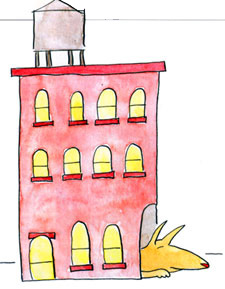HABITAT
Shareholders Can Keep Illegal Pet Despite Lying
June 7, 2010 — In the Brooklyn co-op at the heart of the recently decided 2229-13 Apt. Corp. v. Portnov, shareholders Roman Portnov and Valiantsina Portnov kept a dog in violation of the proprietary lease – and, remarkably, got away with it in court despite the couple's misrepresentations to the board about the status of the dog.
Most co-op boards know about the "pet law" — technically section 27-2009.1(b) of the state administrative code — which essentially states that if a landlord, which includes co-op boards, is aware you have a pet, then the landlord has 90 days to start proceedings to remove it. Otherwise, the pet can stay.
And if the pet owners lie about it and hide the dog? The way the law stands now, they can very well get away with it — as they did in this case.
On February 3, 2009, the board mailed the Portnovs a 30-day notice to cure, alleging that the Portnovs had illegally harbored a dog in their apartment since December 25, 2008. This was well within 90 days. On March 13, with the Portnovs refusing to remove the illegal dog, the board send a notice of termination of the proprietary lease. The co-op then began what's called a "pet holdover proceeding" on April 6.
The Portnovs maintained that they brought their dog, a Shih Tzu, into their apartment in July 2008, that they walked it openly in front of and in full view of the building employees, and that the dog was the subject of discussion at a meeting of all shareholders on September 28, 2008.
Portnovs Complaint
The co-op board argued that the Portnovs did not, in fact, walk their dog openly, and that the couple had misled the co‑op by claiming they'd been keeping the dog briefly for family members and no longer had the dog. The board told the court it sent a notice as soon as it discovered that the dog was actually living in the apartment.
The co-op's managing agent submitted an affidavit that he was aware of the dog in September 2008 — but that the shareholders had assured the managing agent in November 2008 that they no longer had the dog.
The following month, the superintendent was in the apartment and discovered the "tea-cup" sized dog hidden in a closet. On January 9, 2009, the dog was again observed in the apartment. At a board meeting on January 17, the board determined that the Portnovs' statements that the dog was temporary were untrue, and that a holdover proceeding should be started.
Court's Paws Are Tied
The court, however, explained that even if it believed everything the co-op said in affidavits, it was "constrained" to conclude that the co-op had waited too long and so had waived the right to enforce the no-pet provisions of the lease. The co-op responded that the dog was not walked openly where it would have been observed by the building's employees. But the court replied that "openly and notoriously" doesn't mean the pet has to be displayed throughout the building — and besides, the co-op had become aware of the dog in September 2008.
The co-op, of course, took no action at that time because it relied on the Portnovs representations that the dog was in the apartment only temporarily. The co-op didn't conclude that the dog was in residence permanently until January 2009.




